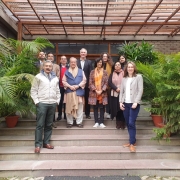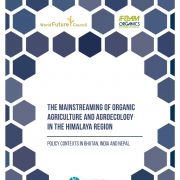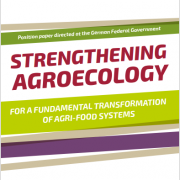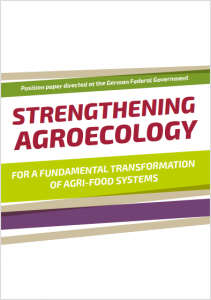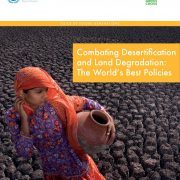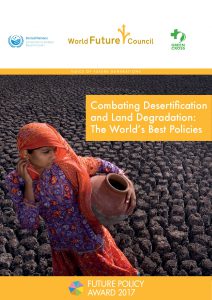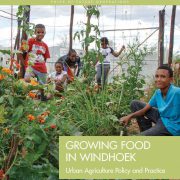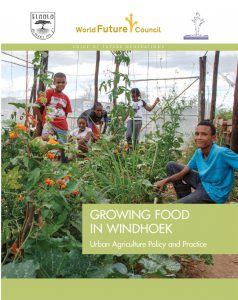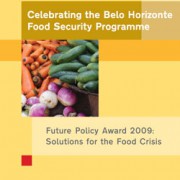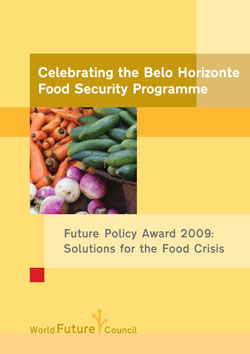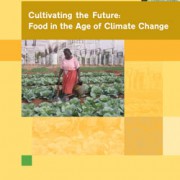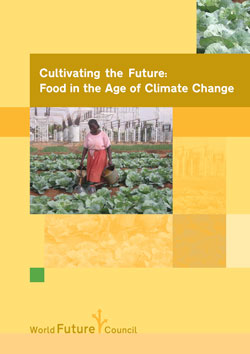The Mainstreaming of Organic Agriculture And Agroecology in the Himalaya Region
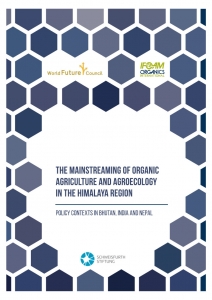
Excerpt
The Mainstreaming of Organic Agriculture And Agroecology in the Himalaya Region: Adequate policies that advance the transition towards sustainable agriculture and food systems to ensure healthy food for all, to overcome social and economic inequalities and to protect our environment, climate, and biodiversity, are urgently needed. After highlighting the world’s best policies scaling up agroecology with the Future Policy Award 2018, the World Future Council and IFOAM – Organics International proudly present the study “The Mainstreaming of Organic Agriculture and Agroecology in the Himalaya Region. Policy Contexts in Bhutan, India and Nepal”, realized with the kind support of the Schweisfurth Foundation. It is follow up of our efforts to showcase existing political support towards organic farming and agroecology and brings new insights on the current institutional efforts and limitations of mainstreaming sustainable agriculture across the Himalaya Region, with a focus on three countries: Bhutan, India and Nepal.
Preview
There is no doubt that organic agriculture and agroecology provide an effective pathway for achieving the Sustainable Development Goals (SDGs) and delivering the 2030 Agenda. The sustainable management of our planet’s natural resources underpins our ability to achieve these
targets. The transformation of our agriculture and food systems will represent an essential step towards this vision. The right to food is recognized by the 1948 Universal Declaration of Human Rights and was enshrined in the 1966 International Covenant on Economic, Social and Cultural Rights. However, discussion on achieving a world free from hunger is often associated with a plea for increasing productivity with any means. This short-sighted approach needs to be reversed. Food systems need to be transformed with a systemic and holistic approach, while food and those who produce it need to be valued. When food is produced in a sustainable way, it increases food security, preserves natural resources, enhances biodiversity, and reduces greenhouse gas emissions. The complex nature of the challenges we face and the urgent endeavour our policymaking is called to address require public policies designed, implemented, monitored, and revised in a coherent, participatory, and comprehensive manner, as defined by the Seven Principles for Future-Just Lawmaking. These are based on the International Law Association’s 2002 Delhi Declaration on Sustainable Development Law.2 In addition, we have to ensure that our policies create a conducive environment for supporting the transition of our food systems. Hence these policies should respect the four Guiding Principles of Organic Agriculture3 and the 10 Elements of Agroecology.
Position paper: Strengthening agroecology for a fundamental Transformation of agri-food systems
Summary
The negative effects of industrial agriculture have long been clear, and agroecology offers a multitude of solutions for the fundamental transformation of the agri-food system. The position paper presents these solutions and is supported by the World Future Council and many other important actors of the agroecology debate.
There is movement in the international debate on agriculture. More and more people – activists, scientists, members of
organizations and some governments – have come to realize that “carry on as usual” is not an option. The IAASTD report (International Assessment of Agricultural Knowledge, Science and Technology for Development) recognized this as much back in 2009. The message has now gotten through: the negative effects of industrial agriculture have long been clear; they include water shortages, species extinction, high greenhouse-gas emissions, soil degradation, and land grabbing. They cause social, economic and ecological damage that harms the
livelihoods of peasants1 and the ability of ecosystems to adjust to the already noticeable effects of the climate crisis. The business model of the international pesticide and seed companies is based on the Green Revolution concept of raising yields through the massive use of synthetic fertilizers and pesticides. But this system is coming under enormous pressure to justify itself. Just a handful of big multinationals control markets all the way from the field to the supermarket. The takeover of Monsanto by Bayer is just one example of
this power. And the power imbalances are increasing between huge corporations on one hand and peasants and workers on the other. Social inequality worldwide is on the rise. Small farms find themselves squeezed out of the market; the human rights of peasants are systematically ignored, especially in the global South; farmworkers toil for a pittance and are exposed to toxic pesticides. According to a United Nations report, 200,000 people die each year from acute pesticide poisoning; 99% of these deaths occur in developing countries.
FPA 2017: Celebrating the world’s best policies to combat desertification
Abstract
In this brochure, we present the winning policies of our Future Policy Award 2017. In partnership with the United Nations Convention to Combat Desertification (UNCCD), this year’s award celebrates laws and policies that successfully tackle land degradation, and contribute to the protection of life and livelihoods in the drylands.
Policies score highly in the Future Policy Award evaluation not only by advancing the sustainable use of resources but also by addressing equity, the eradication of poverty, community participation, and the peaceful resolution of conflicts.
We seek to inspire lawmakers worldwide with these exemplary, award-winning policies, and hope to see their key elements being spread and implemented in the months and years ahead.
Growing Food in Windhoek
Abstract
Windhoek is a growing city, reflecting a global trend: by 2050, the world’s urban population is expected to nearly double, which poses massive challenges for all cities in regards to housing, infrastructure, health, education, jobs, natural resources and food. At the same time, Windhoek has a very testing climate and there is, of course, the water issue.
Windhoek’s vision is that all of its citizens enjoy food and nutrition security. This means that enough and healthy food is available in the city and that all of Windhoek’s citizens can afford to feed themselves adequately.
By producing food in and around the city, we can connect – the production with the market, experiments, ideas and solutions, and people of all ages and all walks of life. When we grow food in Windhoek, we need to do it right. With this handbook, we want to help make connections and develop ideas further.
Future Policy Award 2009: Celebrating the Belo Horizonte Food Security Programme
Abstract
Celebrating visionary policies raises public awareness, encourages rapid learning and speeds up policy action towards just, sustainable and peaceful societies. That is why, each year, the World Future Council chooses one topic on which policy progress is particularly urgent and calls for 3 nominations of model policies that are inspiring, innovative and impactful.
The Future Policy Award 2009 celebrates successful policies for food security – policies that create fair and sustainable food systems, be they regional, national or global, and thus contribute to a better world.
Cultivating the Future: Food in the Age of Climate Change
Abstract
In an age of climate change, policies for the secure supply of food to the world have to be a major priority for national governments and the international community. Security and sustainability of food supply is of the utmost importance for the wellbeing of an ever increasing world population, and for future generations.
